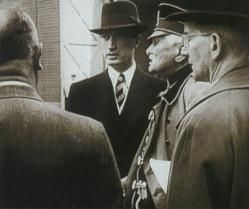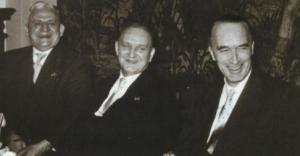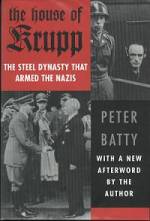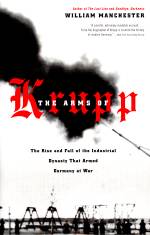 |
|
|
||||||||
| Arms makers depend on two main raw materials - coal and iron ore. Coal is the lifeblood of industry: it provides the power to run the factories, it provides the heat to fire the blast furnaces. And it is the iron ore which is converted into steel - steel for use in cannon, armour plate, tanks and submarines. Eighty percent of Germany's coal and steel industry is centred on the Ruhr valley. Occupied by French troops in 1923, the Ruhr was vital to the economic life of the country. The French presence generated a bitter hatred and a burning for revenge which would help Hitler's rise to power. If coal and steel were the keys to Germany's prosperity and the rebirth of her armaments industry, then the key to that armaments industry was Krupp, Germany's largest and most influential steel concern for more than a century. |
|
|||||||
|
||||||||
|
An older Gustav Krupp greets Reichsführer SS Heinrich Himmler at the launch of the Navy cruiser Prinz Eugen from the Krupp Germania Werft yard at Kiel. |
||||||||
But Krupp was an arms business, and with the secret assistance of the
government and the army it set about getting around the terms of
Versailles treaty. In the 1920s, Krupp artillery design teams were move to
Sweden and the Netherlands, where they continued to develop new weapons.
By the late 1920s, the Allied control commissions had left Germany, and it
was safe for the design teams to return home. Krupp survived the
depression making steel, trains and trucks, but with the accession of
Adolf Hitler to power it was soon back doing what it knew best - building
guns - Thanks to the secret work in the 1920s the concern had advanced new
weapons in production in an astonishingly short time. Diplomat, banker and industrialist, Gustav had initially opposed Hitler
and the Nazis, but on their accession to power he became an enthusiast. In
May 1933 he was appointed chairman of the Adolf Hitler - Spende, a fund
raised by industrialists for Nazi benefit. Hitler lauded his company as a
National Socialist model workplace, and appointed him a Military Economy
Führer in 1937.
Diplomat, banker and industrialist, Gustav had initially opposed Hitler
and the Nazis, but on their accession to power he became an enthusiast. In
May 1933 he was appointed chairman of the Adolf Hitler - Spende, a fund
raised by industrialists for Nazi benefit. Hitler lauded his company as a
National Socialist model workplace, and appointed him a Military Economy
Führer in 1937.Alfried Krupp von Bohlen und Halbach, seen here showing World War I hero Field Marshal von Mackensen around the Krupp artillery works. |
||||||||
NEW GENERATION By the outbreak of World War II, Krupp controlled 87 major factories and industrial plants and 110 companies in Germany alone: the firm also had interests all over the world, having a controlling interest in more than 40 overseas companies. During the war Krupp was the main supplier of heavy weaponry to the Wehrmacht and the Kriegsmarine, using large numbers of slave labourers in its many works and yards. Gustav Krupp suffered a severe stroke in 1941, and although nominally in charge of the company, for the next two years he was little more than a figurehead. In 1943 Gustav handed control to his elder son Alfried, just as the Krupp company was returned from public ownership to the family, Gustav was senile by the end of the war and so escaped being tried for war crimes at Nuremburg. He died at Bluhnbach on 16 January 1950. Son of heir of Gustav Krupp, Alfried Krupp was born on 13 August 1907. Trained as an Engineer at Munich, Berlin and Aachen, he join the company in 1935. In 1936 he qualified as an attorney, in the same year winning a Bronze medal in the Olympic sailing regatta. |
||||||||
|
|
||||||||
|
NAZI SUPPORT Alfried was given responsibility for the company's armaments division, which with German rearmament was becoming increasingly important. In 1937 Hitler awarded him the title of Wehrwirtschaftführer, or Military Economy Leader. He joined the Nazi party in 1938, as soon as the NSDAP began accepting new members after the flood of opportunist "Märzgefallenen" who had joined in 1933. However he had been a "Contributing Member" of the SS since 1931, and was active in the NSFK, the National Socialist Flyer's Corps. Alfried was an enthusiastic supporter of Hitler's war. To all intents and purposes he controlled the Krupp organization from 1940, officially taking over from his father (who had suffered two strokes) in 1942. Under his direction the Krupp concern move to new factories in territories occupied by the Germans, and looted industrial plant from the occupied countries was returned to the Krupp works. Krupp had no compunction about using conscripted labor or camp slaves in his factories. By 1943, when he became sole owner of the company, Krupp was using more than 100,000 involuntary workers, including a number laboring in an ammunition factory at Auschwitz. In all, about three quarters of the slaves working in krupp plants died - which is higher mortality rate than in all but the very worst concentration camps. |
||||||||
|
RETRIBUTION Captured by the Canadians at the end of the war, he was brought before the international Military Tribunal at Nuremburg to be tried both for crimes against humanity and for plundering European industry. Alfried was sentenced to 12 years in prison and his property was forfeited. The firm's board was also tried, and the Krupp family was ordered to sell three quarters of its holdings.  In the changing of Cold War political climate, West Germany was seen by
the Americans as a bulwark against Communism, and to rebuild German
industry, Krupp was needed. Alfried was released from Landsberg in 1951
and its property and companies (valued in the millions) were restored to
him. By the 1960s Krupp had diversified into a wide range of consumer,
industrial and heavy engineering concerns, and Alfried Krupp was once
again one of the world's most wealthy men. He died in Essen on 30 July 1967. To this day his company remains one of
Europe's largest conglomerates.
In the changing of Cold War political climate, West Germany was seen by
the Americans as a bulwark against Communism, and to rebuild German
industry, Krupp was needed. Alfried was released from Landsberg in 1951
and its property and companies (valued in the millions) were restored to
him. By the 1960s Krupp had diversified into a wide range of consumer,
industrial and heavy engineering concerns, and Alfried Krupp was once
again one of the world's most wealthy men. He died in Essen on 30 July 1967. To this day his company remains one of
Europe's largest conglomerates.Alfried Krupp (right) seen in the late 1950s with former Krupp managers. |
||||||||
|
Krupp History : Friedrich Krupp (1787 - 1826) Alfred Krupp (1812 - 1887) Friedrich Alfred Krupp (1854 - 1902) Bertha Krupp + Gustav Krupp von Bohlen und Halbach (1870 - 1950) Alfried Krupp von Bohlen und Halbach (1907 - 1967) Arndt von Bohlen und Halbach (1938 - 1986) Merge with Thyssen AG (1999) Thyssenkrupp (1999 - present) |
Other sites
related to Krupp... Krupp : click here Gustav Krupp : click here Alfried Krupp : click here ThyssenKrupp : click here Gustav Krupp von Bohlen und Halbach : click here Gustav Krupp von Bohlen und Halbach : click here Magazines : Hitler's Third Reich magazine - volume 21 |
|||||||
| KRUPP Related sites |
|
|||||||
|
References / Credits : |
||||||||
 |
Item
166
: The House of KRUPP
,The steel dynasty that armed the NAZIS
The house of KRUPP recounts how one family from humble origins managed through a combination of greed and cunning, to dominate the German armaments industry for nearly a century and a half and to provide weaponry for Germany's military expansionism , and, ultimately, its entrance into two world wars. The company's lurid history is meticulously told. During the 1930s, Krupp Works became the center of German rearmament, due in large part to Gustav Krupp's devotion to the Third Reich, Alfried, his son, took over in 1943, was arrested by the Allies, tried for slave labor, and sentenced for war crimes at Nuremburg. Some of the most famous names in German history - Bismarck, Wilhelm, and Hitler are indelibly linked with the House of Krupp. Krupp cannons were used in Bismarck's wars against Austria and France; its artillery destroyed the Belgian fortifications in 1914, and shelled Paris in 1918; and its stupendous armaments output supplied Hitler nearly single-handedly with heavy artillery, tanks, and U-boats. This updated edition includes an afterwards by the author, who reports on how the Krupps have fared in the thirty-five years since the book was first written. Though the Krupps are a legend, their story is one well worth repeating. Sftbd., 6" x 9", 341 pgs., all text with 9 b&w photos. Peter Batty, Cooper Square Press, ISBN : 0-8154-1155-3 |
|||||||

|
Item 219
:
Arm of KRUPP,
The rise and fall of the industrial dynasty that Armed Germany at war In this narrative of extraordinary richness, depth, and authority, America's preeminent biographer/ historian explores the German national character as no other writer has done. The Arm of KRUPP brings to lige Europe's wealthiest, most powerful family, a four hundred year German dynasty that developed the world's most technologically advanced weapons, from cannons to submarines to anti-aircraft guns; provided arms to generations of German leaders, including the Kaiser and Hitler, operated private concentration camps during the NAZI era; survived conviction at Nuremburg; and wielded enormous influence on the course of world events. William Manchester's galvanizing account of the rise and fall of the Krupp dynasty is history as it should be written - alive with all its terrifying power. William Manchester, Little Brown & Co. ISBN : 0-316-52940-0 soft cover, 6" x 9¼", 976 pages |
|||||||
|
|
||||||
©
one35th - Last updated on :
Sunday, April 20, 2008 |
||||||